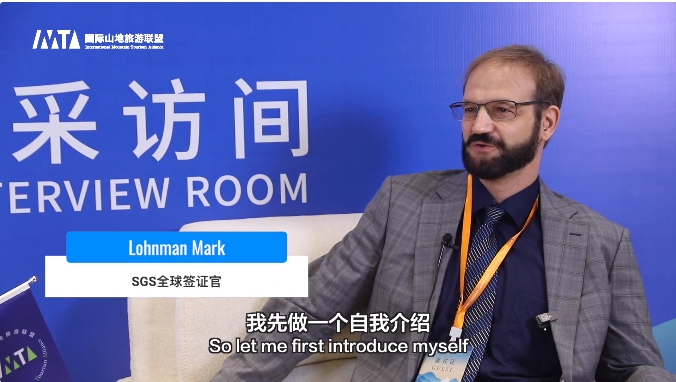Q: Hello Mr. MARK! It is known that SGS is an internationally recognized testing, inspection and certification organization and known as the benchmark for sustainability, quality and integrity. Could you please give us a more detailed introduction of SGS?
A: So let me first introduce myself. My name is Mark Lohnman. I'm originally from Germany. I am global certification manager within SGS group, and it's really honor for us and also for me to be invited to this IMTA event today in Guizhou. Just let me briefly introduce our company, so our company is actually the headquarters situated in Switzerland. We are a global testing inspection and certification company, and globally we have around 100,000 employees, we have around almost 3,000 offices around the world.
Here in China, actually we are here in China since 1991. And we have around 90 offices here in China and it's all about testing with us. We also have around 200 labs within China. Like I said, we are involved in testing, inspection and certification. So this means we cover actually a very wide range of products. We are in industrial products, health care, consumer products, chemical testing, oil and gas, and also like inspection services.
Q: Thank you very much for your introduction. As you introduced, SGS is a highly comprehensive certification and testing organization. So, what relevant investments does SGS have in the cultural and tourism field to help this industry achieve high-quality and standardized development?
A: Actually, in the past, we have done quite a few investment, because as a global testing inspection company, we are also involved in stand-up development. This means it goes up and down the supply chain. When I talk about supply chain here, I mean about all the stakeholders involved. On one hand, it's the public sector. On the other hand, it's the private sector. And the private sector involves stakeholders like the tourism agencies, tour guides, and also accommodation services like hotels. We are also here in a beautiful hotel and convention center. And also catering service like restaurants, leisure, sports equipment and all kinds of these services involved in.

Q: We know that the International Mountain Tourism Alliance is a non-governmental and non-profit international organization composed of mountain tourism related organizations, groups, and individuals. Can you briefly describe the main areas of cooperation between SGS and IMTA in the coming years?
A: I think in the coming years, SGS and IMTA, actually I look for a bright future for our corporation. Because IMTA can bring the expertise for the recreation area, for the mountains, which is now becoming more and more popular, especially for city dwellers, people seek for mountains, for a clean environment. And on the other hand, we as SGS are the professionals, like I already mentioned before, in developing standardization procedures, we are also able to evaluate these procedures and bring alltogether all the stakeholders of the whole supply chain. I see a very fruitful cooperation between SGS and IMTA in the future.
Q: What new opportunities and competitive advantages do you think the cooperation between SGS and the International Mountain Tourism Alliance can bring to both parties?
A: For example, like I said, SGS tests and evaluates certified services in the supply chain. Especially focusing on mountain area, this means focusing on a green area, green development, and also a sustainable development. In the end, it's about how to facilitate the tourists and give them the best service possible in this beautiful area.
Q: The outdoor sports can be dangerous in sometimes. So how do you think that you can help to standardize and keep the industry become more healthy and organized? And to help those tourists to enjoy the outdoor sports, at the same time without getting injured or hurting themselves?
A: I think first when you talk about outdoor sports, if they use some products, for example, like rowing boats or kayaks. So first we as a testing inspection certification company, we can also test according to international standards to make sure the safety of outdoor products the tourists using during those leisure activities. And then on the other hand, when it comes to the facility around, this means you use those products in the tourist environment. We are also now cooperating with standardization organizations so that we can develop further, more safe standards to make the whole process of this tourist leisure activities more safe and more sustainable.
Editor Ⅰ: Zhang Wenwen
Editor Ⅱ: Wu Dan
Editor Ⅲ: Liu Guosong














